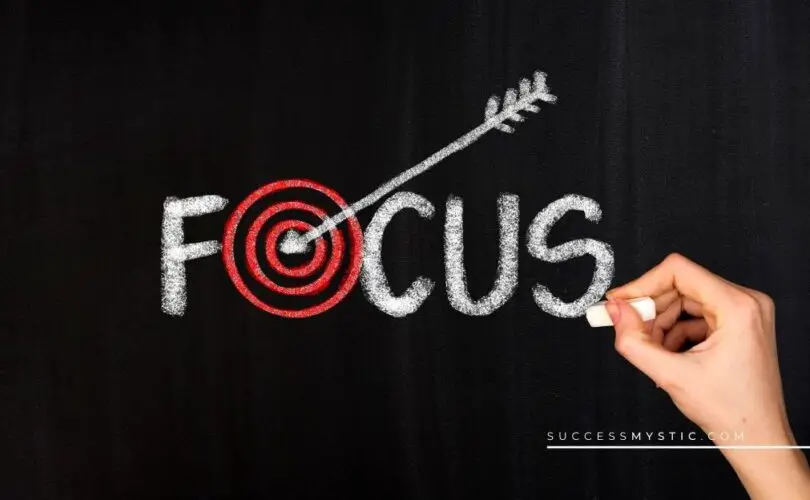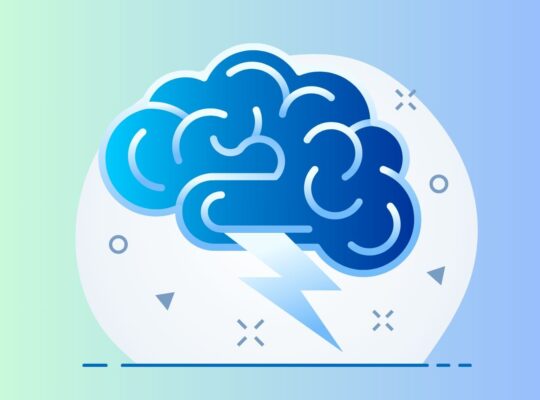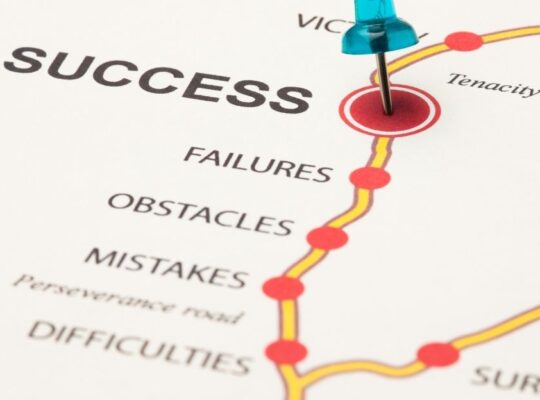In this article: Why honing focus skills is an essential life skill!
There are many reasons why you may want to hone your skills of focus. Concentration can be difficult, and in today’s world where multi-tasking is the norm, focussing on any one task may seem like a monumental feat for your brain.
Training the mind to focus, to attend to one thing or one person, can help you be more productive. It can also help you enjoy life more and to be a better friend and loved one to others in your life. The ability to focus is something you can learn how to do well and retraining your brain to concentrate is something you can work on starting right now.
When we talk about focus, we mean sustained attention on one thing. Focus means you can push all the other distractions away in favor of one task, one person, or one idea.
It can be difficult to focus when there are distractions, alarms, notifications, to-do lists, and countless people vying for your time. But, learning to focus can help you to manage all these things better, feel calmer, and be more productive.
Consider for a moment those times when you can focus. When you are dialed into the task at hand, and nothing else seems to matter. You suddenly realize hours have passed in what felt like minutes. What was different about that situation that allowed you to maintain concentration? And what can you learn from that to apply to other cases where your focus is lacking?
To learn how to focus better, it’s helpful to know what is happening in your brain when you are distracted as well as when you can fully concentrate. Then, you can consider ways to minimize the distracting influences and habits and retrain your brain to focus more efficiently. Like any other skill, focus is something you learn through practice and attention to the ability.
Focus Versus Distraction: How Your Brain Works
Understanding how the brain functions and what conditions support optimal focus will help us build this essential life skill. Let’s consider that everything that causes us to pay attention does so for one of two reasons.
Either we are making a conscious effort to attend to it, which is selective or voluntary focus; or something distracts us and forces our attention away from what we were doing, which is involuntary focus. Both are kinds of concentration, but voluntary, or selective focus, is the one we want to build.
Voluntary focus is like a top-down system. Your conscious mind tells you what to focus on, all your senses gather information and then choose those that are important for accomplishing that goal. The rest of the stimulus is filtered out and pushed aside. You are concentrating on what you want to focus on; you are in “the zone.”
Our brains are wired, though, to recognize stimulus that could be harmful to us, including noises, movement, lights, and other input that could signal danger. This evolutionary trait is essential for our survival, but because we cannot control it, it means that we can get distracted by a number of inputs that aren’t really life-threatening, but our brains recognize as possibly important. This bottom-up system is our involuntary focus, otherwise known as distractions. It is hard wired and is always asking, “What else needs my attention?”
Every time your body receives messages that break attention, like noises or lights, our selective focus process has to start over. We have to refocus, and it can take as much as 25 minutes to get back into “the zone,” so staying there is very important. All these distractions are exhausting your cognitive capacity, and you have less energy for maintaining focus.
So, the most important thing you can do is to create an environment that limits the distractions with which your brain has to deal. For each of us, what is distracting will likely be different. Some of us find loud music distracting while others lose focus when it’s silent. Some may appreciate a lovely view out the window while we are working while others are too tempted to stare out the window all day.
You must figure out for yourself what is distracting and what promotes concentration. Knowing your own distraction triggers will help you create an environment conducive to sustained focus. Here are some everyday distractions and how to eliminate them.
Lights
Most of us don’t even realize how many blinking lights we encounter each day, and yet each one of these affects your brain. Set up your workspace the way you want it, then look around carefully at all the lights in your room. Is the overhead light slightly flickering?
Are the LED lights blinking notifications on machines in your space? Does the light from the business across the street appear in your peripheral vision? Find ways to minimize or change any of these you find distracting. Placing tape over flashing lights is a great way to help you ignore them. Moving your desk and changing overhead lighting may be necessary to create the optimal space.
Sounds
If you are the type of person who is easily distracted by noises, wear noise-canceling headphones or earplugs. This works well if you are on a busy street or crowded area where there is constant movement and commotion. If you find music helps you focus better, then listening to your headphones while working can help eliminate background noise while also assisting in your concentration.
Control as many of the electronic noises as you can. Turn off the sound on your computer, so you don’t hear alerts. Do the same on your phone. If you are not expecting any calls or don’t use your phone for work, turn the ringer entirely off.
Digital Demands
The digital age has brought about a phenomenon where may no longer feel they can unplug. If you are one who continually checks email, refreshers your social media stream multiple times a day, or always has a chat browser open, you are creating distractions for your brain that interrupt your voluntary focus.
When you need to focus, when you are building up your new concentration muscles, turn everything off that you can ignore while you are working.
Set aside specific times of the day to check and return emails. Turn off all notifications and alerts while you are focusing. Browsers have extensions that allow you to block specific websites or applications for certain hours each day.
Use these to shut down your access to social media or other distracters while you are focusing. Some even find it helpful to completely turn off their phones or work in airplane mode to block the possibility of digital distraction. Experiment with strategies to see what works for you.
Internal Distractions
Each of us has different demands that pull our brains in many directions throughout the day. You must first identify what those are for you.
Do you find yourself obsessing over previous conversations, worrying about what you need to do later, fretting over someone for whom you care?
This is where some of the strategies outlined below will be helpful. Learning to recognize then minimize these internal distractions will be beneficial to maintaining your focus even when your environment is ideal for concentration.
Learning To Focus
There are many ways you can retrain your brain and maximize your environment to work on better focus. By practicing your focus skills, honing them over time, you can easily find the power of concentration when you need it. The following are exercises and strategies that will help you develop your ability of focus.
1| Practice Mindfulness and Intentionality
Before you can learn to focus more efficiently, you have to be aware of when you are not focused and what distractions are most likely to force you to lose focus. Start by being mindful of how and when your brain fails to attend, noting any triggers, including how you were feeling, what you were doing, etc. The first step is intentionally observing the problem; then you can begin to address it.
Next, practice mindful attention. Be aware of when you can sustain your attention, what type of motivating factors help, and when you were successful at focusing.
This will tell you a lot about the work you need to do as well as some strategies that may work better than others to help you retrain your brain.
2| Prioritize Your Tasks
Since we know that attention work from the top down, organize your work in the same way. When you are creating your task list, place the most important items at the top and the least at the bottom. If you have a massive project, generate smaller sub-goals. Make each one specific, so you’ll know when you’ve accomplished it.
Next, set specific deadlines for each task, whether by day or time, depending on your need. Deadlines can help you monitor your progress and are influential motivating factors, especially if you place real consequences for each. What is your reward for completing one or two tasks? What is the negative result of missing your deadline? Find what motivates you, whether it’s a sweet treat, a walk around the block, or a something fun for after work is over.
Once you have a list and priorities, it adds weight to your project, helping you to stay focused when you need to. And if you can’t get to the lower part of the list today, that’s okay. Maybe those items move up in priority tomorrow.
3| Meditation Teaches You Focusing
You can change your brain through meditation. Researchers have noted an increase in brain tissue surrounding the areas related to attention in those who meditate regularly. This shows you can train your brain with practice and over time. Learning to meditate is a life skill that can help not only build focus but also reduce stress, treat pain, and improve your sleep.
While there are differing definitions of meditation, the basic premise is sustained focus on your breathing while pushing away all other thoughts. Meditation allows you to practice keeping distractive thoughts at bay while focused on one activity.
There are several useful mobile apps available for today’s smartphones that provide guidance on meditation, and starting out with just a few minutes each day, then building up to more extended sessions will help you develop the right attitude and skills necessary for concentrated focus. Meditation is easy to practice anywhere once you have the right tools, so it’s an excellent strategy for everyone.
4| Work on Consistency
Building a routine that maximizes when your brain is most focused will help you immensely. For some, their most-focused hours are early in the morning, while others are most productive in the late afternoon.
Recognize when your brain is at its prime regarding focus and plan sustained work when you focus on your most important projects during those times. Protect that time and be sure you can be free of distractions, as well.
Set aside time for sustained focus and practice each day, and you will begin to build your skill set. You are practicing focus, just like musicians and athletes practice daily.
Because your environment is so important to decreasing distractions, be sure to use consistency here, too. Even if you must be in different places, focus on the criteria that make it easier for you to concentrate. It is lack of movement in the space, what noise level do you prefer, what type of light works best for you? Then opt for places with the most optimal conditions each time you are trying to focus.
Once you have started to see improvement in your focus skills, you can start varying things more, but start slow with that process, or you’ll experience backward slides in your concentration. While you want your focus skills to be transferable and flexible, you don’t want to change too much too fast, before you’ve had a chance to make lasting changes to how your brain is working.
5| Work in Small Chunks, Then Take a Break
Just like when you learn a new physical skill or are learning a new language, you can’t do it all at once. Learning to focus required practice and a building of stamina. If you are distracted, start with just five- or ten-minute increments.
Set a time and work on staying focused for the entire period. Once the timer goes off, take a short break. Let your mind rest and wander all it wants during your break time. It will help you recognize when to focus and when to indulge the distractions.
Then, move on to the next increment.
Your brain needs rest as much as it needs retraining for focus, so don’t neglect the breaks as necessary. More extended breaks, like sleep, are essential for your brain to process, store new information in long-term memory, and repair.
6| Use Enjoyable Activities to Practice Sustained Focus
For most of us, it is easier to get lost in a good book or movie than it is to get lost in a good work project. But, how often are you able to sustain your full and complete attention even while doing those things you enjoy? Using fun and engaging activities to train your attention is a great way to stay motivated, to practice your new skills, and to enjoy yourself in the process.
Even when we are doing things we enjoy, our brains can still find ways to become distracted and start drifting. This usually happens because our minds get bored or are no longer engaged. Distraction happens a lot with watching television.
Ads create distractions, storylines are not always terribly inventive. Instead, you want to select an activity that will keep your brain engaged throughout and that offers a bit of a challenge. Books are often good for this, as are movies with engaging stories.
Pick something you can do with few distractions and that you enjoy. Movies and books are good, but it can be anything you like to do that is mentally stimulating, and you can do for a more extended period.
The point is to do that one thing, stay focused on it, and don’t let other things distract you. Put down your phone, reign in the mental background chatter, and focus on doing something you enjoy. Actively do that one thing and only that one thing until it is complete.
Through the escapism that stories and entertainment can offer, you can practice sustained focus while also having fun. Doing this regularly helps you build stamina for active attention and are calibrating your brain to recognize what prolonged attention and focus feels like again.
7| Work Toward Healthy Habits All Around
Your brain is going to be at its best when it has everything it needs to be healthy. This includes adequate, quality sleep, proper nutrition, sufficient blood flow from a healthy heart, and cognitive engagement that is challenging and novel.
One reason you may be distracted is your brain is tired, lacks the right nutrients, or is thirsty. Taking care of your body is a great way to support concentration and focus, so spending time each day on eating a healthy diet, getting plenty of exercise, and getting a good night’s sleep cannot be overlooked as essential strategies for building focus as a life skill.
Practice Makes Permanent
While the adage of practice makes perfect is incorrect, when it comes to your brain, practice does help to make a learned skill permanent. Only by actively working on your focus can you better develop this vital life skill.
It will not be something you can change overnight, but with mindfulness and intentionality toward this important goal, you can make steady progress and retrain your brain for focus.
Understanding what causes distraction and how to minimize it is the first step.
Finding the strategies and tools that work best for you is essential as well. Remember to keep working and don’t give up, because, without practice, you will never be able to learn this important life skill fully.







